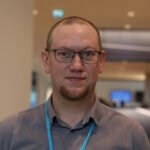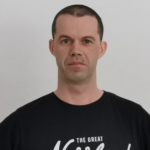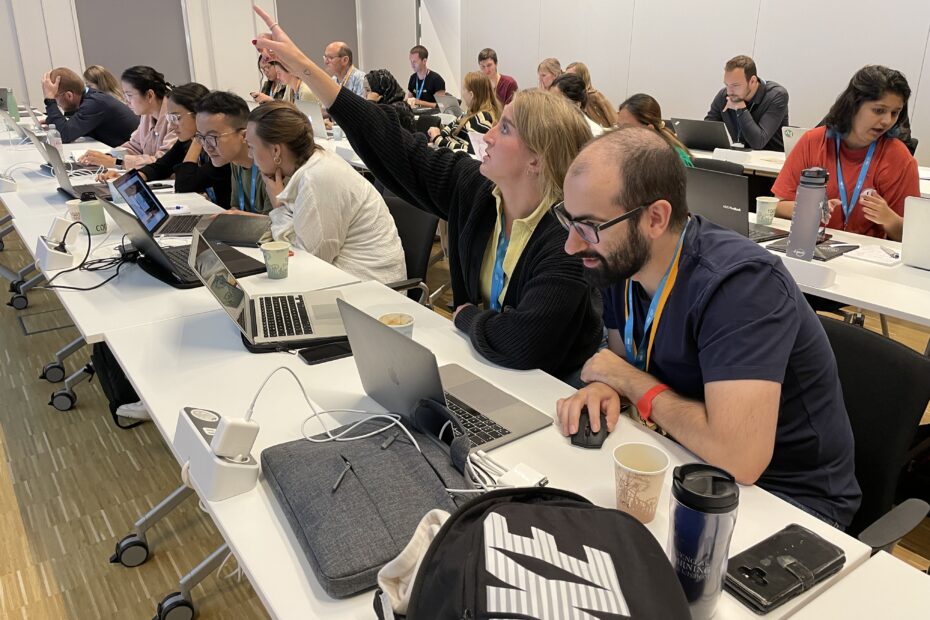Selma Maric, Esko Oksanen and Michael Hall on the value of taking courses and networking.
“The networking possibilities are great and I have initiated collaborations with several of the teachers and peers after taking on-site courses like the InfraLife integrative structural biology course. I even got friends for life, says Selma Maric.
Selma Maric at MAX IV Laboratory

Offering the course to multiple stakeholders is unique and puts further emphasis on networking and future collaborations cross sectors.
Tell us about a course you attended that made a great impact on your future carreer/network.
I have participated in several longer on-site courses, for example The Bombannes Summer School on scattering methods in France and an EMBO course in Corsica.
The Bombannes Summer School was a two-week course with a mixture of lectures, practical’s and social activities. I got to meet with scientists within the field and even the professors that invented some of the theories used to analyze data. This networking possibility gave me contacts useful throughout my career. I have initiated collaborations with several of the teachers and peers and have published numerous papers with these contacts. Even now, several years later I initiate partnerships with people that continued their careers in industry or academia. I have started a research theme, Northern Lights on food at LINXS and recently I initiated a project to study hair with imaging techniques, after being contacted by a friend working in L’Oréal.
What was the most fruitful components of the course?
In my opinion, the networking is one of the most beneficial outcomes of a course like this. In addition, for the course we are organizing now, it is an amazing range of techniques we can offer covering SciLifeLab, MAX IV, ESS and beyond. Knowledge about these infrastructures, and connections with persons working here opens for so many tools, research areas and possibilities.
What students do you expect to apply for this course?
I think this course is great not just for PhD students but also for more senior scientist that wants to know more about these integrative structural biology methods. All these infrastructures offer state of the art tools, not just routine techniques, which might be of extra interest also for researchers in the life science industry. Offering the course to multiple stakeholders is unique and puts further emphasis on networking and future collaborations between different sectors.
Esko Oksanen at ESS

I don’t think there is a similar course available. We truly focus on the integrative aspects of structural biology. In the long run it is very useful to learn about techniques other than “you own”.
Tell us about a course you attended that made a great impact on your future career/network.
When I was a PhD student it was a great inspiration to attend courses and to see the instruments in real life. I attended the Hercules course in Grenoble, France. It was very useful since it covered techniques I did not use myself, which gave me knowledge about other possibilities. It is great to both focus on your own technique and to get the broader picture.
How would you describe the set up and content of the InfraLife integrative structural biology course?
I don’t think there is a similar course available. There are several expert courses focusing on specific techniques, but here we truly focus on the integrative aspects of structural biology. We cover many different techniques, from biophysical characterization of samples and pre-screening to experiments and data analysis. You will learn what goes in and what goes out, pros and cons with different methods and how you can combine data to get the full picture.
What students do you expect to apply for this course?
Scientists that work with one or several of the techniques the course will cover or students that work on a biological problem where different structural biology techniques could be useful. You don’t have to be an expert on structural biology, the course rather give you the opportunity to discuss with persons that are experts.
Michael Hall at SciLifeLab

Even now as a more senior researcher I would love to attend this course. I have realized the value of complementary techniques. When I was a student, specialised one-week courses for one technique were available, but something this broad would have been fantastic.
Tell us about a course you attended that made impact on your future work.
I remember taking a course at ESRF in Grenoble, France, during my postdoc period in Umeå. It was specifically on x-ray crystallography and how to more effectively assemble data to solve the phase problem. We were about 30 participants and during the course everyone had a presentation of their research. We also shared rooms and really got to know each other. It was valuable for my future work. I had earlier run samples at ESRF, but after really getting to know people there I could years after easily discuss with the people there and felt really at home with the place. I learned things that made it possible to solve structures I never could have solved without the knowledge.
The combination of learning things together and exploring the place, in this case the beautiful Grenoble and French cuisine, was a great match. We will arrange this course in a similar way.
What students do you expect to apply for this course?
I think a mixture of students from different sectors would be great. I have worked in industry before my current position at the Cryo-EM facility here in Umeå and independent of sector, we are all trying to solve scientific problems. For example, PhD students with an industrial connection and relevant field should be a perfect fit. I have followed the development of x-ray crystallography, mass spectrometry and now Cryo-EM, and the techniques are complementary, which is also the focus of the course. Studying dynamics through NMR is also very interesting.
Cryo-EM excites people, it is intuitively attractive that one can look at membrane proteins and other complex structures. There is great interest from the pharmaceutical industry for this technique and the SciLifeLab facilities have increased their capacity greatly in recent years.
Would you like to take the course you are organizing?
Even now as a more senior researcher I would love to attend. I have realized the value of complementary techniques. When I was a student, specialized one-week courses for one technique were available, but something this broad would have been fantastic. Even organizing the course is of value, it connects us at the different facilities and infrastructures. We are for example developing software solutions for analyzing data via PreSTO that we can use even beyond the course.
